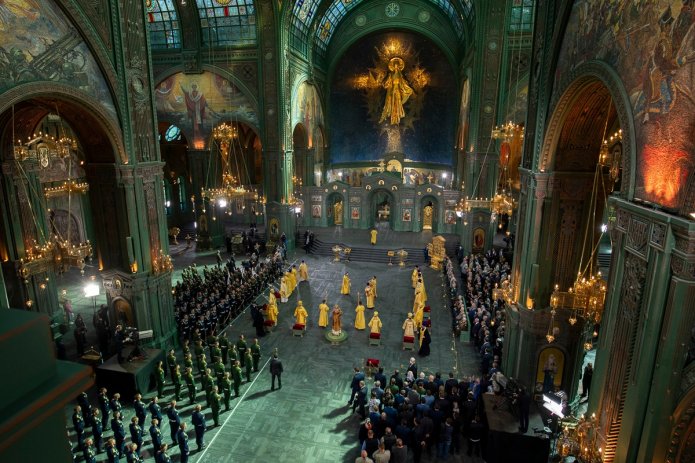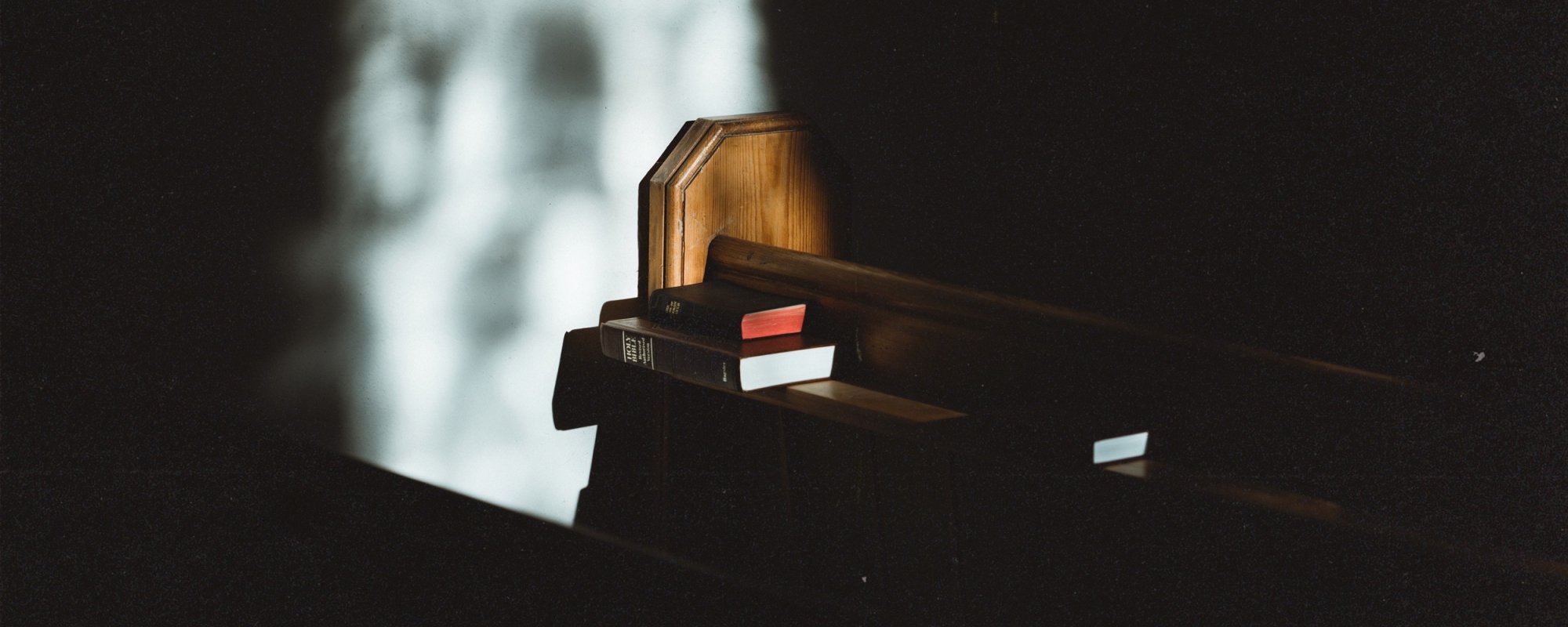Protestant preacher Eduard Charov was fined 65,000 rubles (roughly $800) for anti-war posts on social media and criticizing the state. We discuss how Russian authorities persecute Orthodox clerics and Christian leaders of other denominations if they disagree with the official position on the war in Ukraine broadcast by the Russian Orthodox Church and the government.
A neo-Pentecostal preacher from Savinovo (a village of 227 people in the Urals), Eduard Charov was sentenced to a fine of 45,000 rubles ($550) for «discrediting the Russian army» (Part 1 of Article 20.3.3 of the Code of Administrative Offences) and 20,000 more rubles (just under £250) for «inciting hatred or animosity» (Article 20.3.1. of the same Code). The ground for his case was a post on his social media: Charov opposed the war in Ukraine and criticized the actions of the Russian authorities. «You churchmen! Come to your senses! Be wise! Think about it: would Jesus Christ go kill in Ukraine????!» he wrote after the start of mass conscription.
More than ten years ago, Eduard Charov founded a shelter for the homeless, sick and elderly in Savinovo. In Autumn 2022, he invited «conscripts who fled from mogilization» (a popular bitter pun combining «conscription» with «grave») to the shelter as well. Young men were offered «temporary shelter, food, money for travel expenses to get to other cities» and information about similar initiatives in other regions. «We guarantee anonymity», Charov emphasized in his ad.
The two cases against the preacher were considered by the District Court of Krasnoufimsk on April 18. Charov referred to the article he was charged with as «discrediting Russian fascism».
«It’s a lawless damn war»
Eduard Charov’s case is far from the only example of persecution of Christian religious leaders for their anti-war position. In August 2022, a court in Orel (a city about 370 km from Moscow) imposed a fine of 40,000 rubles on Alexander Legostaev, pastor of the Church of Evangelical Christians-Baptists, who published an anti-war appeal on social media.
Orthodox clerics face pressure, too. A former priest of the Russian and Ukrainian Orthodox Churches, Ioann (Dmitry) Kurmoyarov, has been in pre-trial detention since June 2022. The grounds for the criminal prosecution were several videos, including a recording where Kurmoyarov says that the Russian soldiers killed in Ukraine will not go to heaven, but to hell: «‘Blessed peacekeepers’ go to heaven, ‘peacekeepers’, do you see what the problem is? And those who unleashed aggression will not be in heaven.» OVD-Info featured the story of Kurmoyarov’s life, full of protest against the political mainstream both in Ukraine and in Russia.
In October 2022, ROCOR (A)’s priestmonk Nikandr (Evgeny Pinchuk) from Verkhoturye was fined 100,000 rubles ($1225) in a criminal case for «repeated discreditation of the Russian army» (Part 1, Article 280.3 of the Criminal Code). The priest drew attention because of the post on his social media, in which he called the actions of the Russian military aggressive. OVD-Info published his monologue.
A criminal case was opened against Dmitry Baev, the former deacon of the Church of the Nativity of John the Baptist in Kirov, in April 2022, for «disseminating knowingly false information» about the army (Clause «d», Part 2, Article 207.3 of the Criminal Code). The reason was posts on his social media saying, in particular, that the Ukrainian military «sent 17,500 orcs to the next world», and «Putin’s entourage is afraid of telling him the truth». The day after the start of the full-scale war, Baev resigned from the church and left Russia with his family.
In March 2022, Baev was banned from ministering and then was defrocked in October. He was put on the federal wanted list, his flat was searched, and his profile on Russian social media suspended.
Clergymen are routinely charged with «discrediting the Russian army» (Article 20.3.3 of the Code of Administrative Offenses) for expressing their anti-war position. Father Ioann Burdin, rector of the Church of the Resurrection of Christ in the village of Karabanovo, was fined 35,000 rubles ($430) in March 2022 for an anti-war sermon and putting up a link to an anti-war petition on the parish website. After that, he left the post of rector. In December 2022, Gleb Krivoshein, a cleric of the Yaroslavl Wonderworkers Church in Kazan, was fined 15,000 rubles (just over $180) for signing the same petition.
Archbishop Viktor Pivovarov, 86, of Krasnodar Krai, was fined 40,000 rubles in March for a sermon. «If the tanks are under our windows, it means we were attacked and we need to defend ourselves», he explained. «If our tanks are by their windows, then this is a lawless damned war. That’s it».
Sergei Shcherbyuk, deacon of the Sochi Church of the Nativity of the Blessed Virgin Mary, was also fined in September because of a conversation with parishioners in which he expressed his anti-war position.
A similar case against Maxim Nagibin, an Orthodox priest, was dismissed by a court in Krasnodar Krai. The case was originally opened because of a sermon posted on social media. Nagibin stated that he considered the war against Ukraine «a crime and a great disgrace». At first, the case was returned to the police due to the fact that the case documents did not clearly indicate who posted the video and where. After re-entering the court, the case was dismissed as the statute of limitations expired.
At the end of March 2022, Sergei Titkov, a priest and rector of the Church of the Intercession of the Theotokos in Ryazan, asked to be relieved of his post. Earlier the Ryazan diocese of the Russian Orthodox Church repeatedly issued warnings to him for social media posts criticizing the authorities and the war, as well as his refusal to recite the prayer «for the restoration of peace» blessed by Russia’s pro-Putin Patriarch Kirill.
At the same time law enforcement in the Ulyanovsk oblast visited the house of the priest Georgy Sukhobokiy, who had left for Poland by then. Sukhobokiy associated the visit with the fact that he «tells the truth about the war with Ukraine». Back in 2021, Sukhobokiy was banned from holding services and attending his own cathedral, and was sent to a monastery for «spiritual rehabilitation» after saying that he was happy to shake Alexei Navalny’s hand.
Andrey Kordochkin, Archpriest of the Spanish-Portuguese Diocese of the Russian Orthodox Church, spoke out against the war and was suspended from service for three months in February. The parishioners of his church in Madrid made a complaint. In an open letter they demanded that the authorities «take action» against Kordochkin and stated that he defiantly refuses to pray for Russia, considers it a fascist state, and calls the war supporters «zombies».
In the same month, Ioann Koval, the cleric of the Moscow church of Andrew the Apostle in Lyublino, was temporarily banned from ministering. He was also denounced by his parishioners, who disliked that the priest replaced the word «victory» with «peace» in a prayer.
According to the «Christians Against War» project, at least 31 Christians of various denominations have now faced pressure in Russia.
«Mobilization of the spirit»
Despite the protest of some of the clergy, including those in the Russian Orthodox Church, the official position of the Orthodox Church and its head, Patriarch Kirill of Moscow and All Rus', remains pro-war.
In particular, the Patriarch called on Russians for «mobilization of the spirit» and stated that death «in the line of military duty» «washes away all the sins that a person has committed». «We broke the back of fascism, which would undoubtedly have defeated the world if not for Russia, if not for the feat of our people», Kirill said in April 2022. And in March 2022, he blessed the reading of the prayer for the «restoration of peace». «As for the foreign people that desires a feud and takes up arms against the Holy Rus', forbid and overthrow their plans», the text of the prayer said.
The war is also met with support from ordinary clerics. Father Sergey Kandybin from Irkutsk complained to the Federal Security Service about his parishioner Sergey Uglyanitsa after a private conversation about the war in Ukraine. Uglyanitsa was charged with discrediting the Russian army, but the case was later dropped because the statute of limitations had expired.
«What we are looking at is not just a personal opinion, a personal sin, a personal mistake of some hierarch. We’re talking about a certain matrix of Byzantine Orthodoxy, which incorporated imperial consciousness, justification of the imperial sword, and appeal to force to solve problems», former Protodeacon Andrei Kurayev explained the position of the Russian Orthodox Church in an interview with Popular Politics.
The Russian Orthodox Church actively assisted the Russian authorities in spreading the narrative of war and great victories even before the full-scale invasion of Ukraine. In 2020, the official Church of the Russian Armed Forces was opened near Moscow. The opening was timed to coincide with the 75th anniversary of the Soviet army’s victory in the Great Patriotic War, or World War II. «[The memory of the Victory] is always with us, it gives us the strength to serve our country and moral precepts from which we have no right to retreat and will never retreat», Putin said at the opening of the church.
Images dedicated to the wars in Chechnya, Georgia and the occupation of Crimea adorn the walls of the Church of the Armed Forces. And, according to perito media, a blank space has been left next to the stories from the past, evidently for future wars. The steps of the church are made from melted down German tank tracks, and the main icon is painted on planks made from a Mosin rifle buttstock and an old cannon carriage.

«Patriarch Kirill set a course to turn the church into one of the power ministries 10 years ago», Andrei Kuraev mentions in a conversation with DailyStorm in October 2022. «Today we can see that the law enforcement have protected themselves very well from any criticism with all kinds of laws on discrediting the army and on ‘fakes’». The former protodeacon called the situation «a known path to totalitarianism».
Nevertheless, as criminal and administrative cases against Orthodox priests and representatives of other Christian confessions show, a pro-military position for Christian is not the only option for clerics in Russia. Last spring, the clergy of the Russian Orthodox Church published an open letter calling for a ceasefire and the end of the war. It was signed by 293 people.
In the letter, clerics noted that «no non-violent call for peace and the cessation of the war should be suppressed by force and considered a violation of the law, since this is a divine commandment: ‘Blessed are the peacemakers’».
«A priest is always called to unequivocally denounce evil», Father Ioann (Giovanni) Guaita said in an interview with Pravmir. A hieromonk with the Moscow church of Cosmas and Damian, Guaita was among the signatories of the open letter. «If they don’t do it… How do I put it? They become a part of that evil. And if someone commits, preaches, or just ideologically supports violence, they are no longer a Christian».



